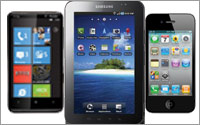 One out of every five visits to ecommerce Web sites now comes from either a tablet or smartphone, signaling that attribution paths and technology will
become increasingly important in 2013.
One out of every five visits to ecommerce Web sites now comes from either a tablet or smartphone, signaling that attribution paths and technology will
become increasingly important in 2013.
Tablets and smartphones began showing significant market share improvements during the 2012 holiday season -- including on Cyber Monday, when Web site
visits from both devices more than doubled in one year, from 7.9% to 18.9%, according to Monetate, which assists companies like Delta, Best Buy and Macy's use data to market online.
The
Apparel and Accessories category proved the most popular for online shopping during the holidays -- followed by books, tickets, daily deals and consumer electronics, according to Monetate. Web site
experiences for smartphones are not typically optimized, so while shoppers use smartphones to research products, most move to computers or tablets to make the purchase. In fact, conversion rates from
tablets were slightly higher on the Tuesday at 6.72% following Cyber Monday at 6.31%.
advertisement
advertisement
Tablet search could drive upwards of $5 billion in revenue for Google in 2013, according to Marin
Software, which filed an S-1 Wednesday with the U.S. Securities and Exchange Commission to take the company public. The report estimates that cost-per-click prices for tablet search ads rose 25% in
2012.
Some of the biggest challenges marketers will face in 2013 involve following consumer attribution paths to mcommerce sites, as well as the differences in targeting and bidding ad
formats. Content and location leading consumers to purchase on mobile devices will become more important than device type in 2013.
With the emergence of newer ad formats, such as click-to-call
ads, mobile ad campaigns will continue to become more sophisticated, with Microsoft suggesting the addition of video Skype features in click-to-call mobile ads.